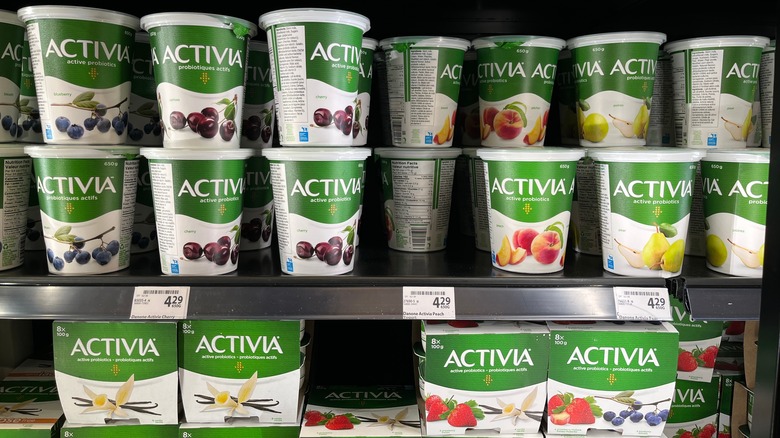Avoid Eating Activia Yogurt (And A Few Other Brands) If You Have This Medical Condition
According to Harvard T.H. Chan School of Public Health, yogurt is made by heating milk that is combined with certain types of bacteria, including Lactobacillus bulgaricus and Streptococcus thermophilus, and leaving it to sit for several hours at a temperature of around 110 to 115 degrees Fahrenheit. Other types of bacteria might be used as well. These bacteria convert a sugar called lactose into lactic acid. This causes the milk to thicken and gives it a tart flavor.
Many of yogurt's health benefits are derived from the bacteria that are used to produce it. Eating yogurt may increase the diversity of your gut bacteria, influencing your risk of developing conditions such as obesity, type 2 diabetes, irritable bowel syndrome, and various chronic inflammatory diseases.
One brand of yogurt in particular, Activia, boasts that it is designed to contain billions of live and active cultures of Bifidobacterium animalis lactis DN-173 010/CNCM I-2494. They claim that eating their brand of yogurt twice a day for two weeks can help reduce digestive issues like gas, bloating, abdominal discomfort, and "rumbling" when it's included in a healthy lifestyle with a balanced diet.
However, if you eat Activia's 60-calorie probiotic yogurt, you may want to reconsider if you have pre-diabetes or diabetes. It contains the artificial sweeteners sucralose and acesulfame potassium, which some studies have linked to increased risk for diabetes.
Activia's artificial sweeteners linked with diabetes risk
If you have diabetes, it might seem like a natural choice to stay away from added sugar and look for foods with artificial sweeteners since they may be better for your blood sugar and help you avoid excess calories. Containing only 60 calories, Activia's probiotic yogurt seems like it would fit the bill. However, its artificial sweeteners may not be as diabetes-friendly as you'd hope.
For example, a 2016 study in The Journal of Nutrition found a link between greater consumption of artificially sweetened drinks and diabetes. Normal-weight individuals developed diabetes more often and had higher fasting glucose and worse β-cell function. And, more recently, a 2020 study in the Journal of Family Medicine and Primary Care found that people who used artificial sweeteners had increased levels of insulin which could lead to insulin resistance. Insulin resistance is a condition in which muscle, fat, and liver cells stop listening to insulin's signals to remove sugar from the blood.
Better yogurt choices for those with diabetes
It should be noted, however, that the jury is still out on whether any or all artificial sweeteners are truly bad for those who have diabetes or are at risk for it. Several health organizations, including the Academy of Nutrition and Dietetics, the American Heart Association, and the American Diabetes Association, advise that non-nutritive sweeteners can help people who have diabetes with blood sugar control.
However, if the research gives you pause, you may want to seek out yogurt brands that do not contain these substances, even if they are not backed by any sort of health claims like Activia is. Healthline suggests avoiding any yogurts with sugary toppings like candy and granola. Instead, they say to choose plain yogurt and add your own healthy toppings like fruits, nuts, and seeds. Fruits provide natural sweetness along with fiber, vitamins, minerals, and various phytonutrients.
If fruit doesn't provide the level of sweetness that you desire, Joanne Rinker, MS, RD, LDN, CDE, FAADE, who is a spokesperson for the American Association of Diabetes Educators, told Today's Dietitian that she recommends nutritive sweeteners for her patients. "I prefer to stay away from chemicals and choose natural sweeteners," she said. Among her favorites are sugar, brown sugar, honey, and pure maple syrup. When you start with a base of plain yogurt, you are able to control just how much sugar you add.



